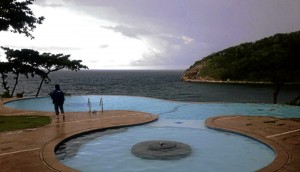
VIEW from a resort in Boracay, the world famous resort island in Aklan that a Supreme Court order said should be left untouched. LYNETTE VILLARIBA
Boracay Island, recently named by an international travel magazine as the world’s best island destination for 2012, must be left untouched.
The Supreme Court has indefinitely suspended the P1-billion reclamation project on the beach paradise due to the failure of the Aklan provincial government to conduct public consultation and a thorough study of the project’s effect on the environment.
Acting on the petition filed by a group of resort owners, the high court issued a writ of continuing mandamus directing the local government unit (LGU) of Aklan, the Department of Environment and Natural Resources (DENR) and the Philippine Reclamation Authority (PRA) to stop all activities in connection with the 40-hectare reclamation project.
Unanimous vote
Voting unanimously, the court converted the temporary environment protection order it issued on June 7, 2011, into an indefinite suspension of construction projects in Boracay and the nearby Barangay Caticlan in Malay town on mainland Aklan, which serves as a takeoff point to the beach island.
“Any impact on the Boracay side cannot be totally ignored as Caticlan and Boracay are separated by a narrow strait,” the tribunal said in a 68-page ruling written by Associate Justice Teresita Leonardo-De Castro.
“In the meantime, the (Aklan provincial government, the DENR and PRA)… shall immediately cease and desist from continuing the implementation of the project… until further orders from this court,” the resolution added.
The P1-billion undertaking aims to reclaim 40 ha from the sea, an area nearly twice the size of the University of Santo Tomas campus in Manila, to help accommodate the growing tourist arrivals in the white-sand island.
Changing island’s shape
But the high court said altering the contour of the key-shaped island “becomes more imperative because of the significant contributions of Boracay’s white-sand beach to the country’s tourism trade.”
It said the writ of mandamus allowed the court to “retain jurisdiction after judgment in order to ensure the successful implementation of the relief mandated under the court’s decision.”
In its petition, the Boracay Foundation Inc. (BFI), an organization of some 60 beach operators on the island, claimed the ambitious project would only lead to the destruction of the world-famous tourist destination.
The high court said construction and other activities along the coastline of Boracay required Aklan “to proceed with utmost caution in implementing projects within its vicinity.”
“The Local Government Code establishes the duties of national government agencies in the maintenance of ecological balance and requires them to secure prior public consultation and approval of local government units for the projects,” said the ruling.
Garbage, sewage
The court sustained the argument of BFI that the construction of more business establishments on the island “could cause pollution as it could generate garbage, sewage and possible toxic fuel discharge.”
In ordering the Aklan provincial government to secure necessary permits, the court dismissed the argument of the DENR’s Environment Management Bureau (EMB) in Western Visayas that DENR Memorandum Circular 2007-08 exempted LGUs from obtaining permits for their projects.
“This is because a memorandum circular cannot prevail over the Local Government Code, which is a statute and which enjoys greater weight under our hierarchy of laws,” it ruled.
The tribunal also stressed that “prior consultations and prior approval” from residents, nongovernment organizations (NGOs) and other stakeholders were required by law “to have been conducted and secured” by the Aklan provincial government.
“Accordingly, the information dissemination conducted months after the ECC (environment clearance certificate) had already been issued was insufficient to comply with this requirement under the (law),” it said.
New or old?
The court ordered DENR-EMB to determine if the project was a single or a “colocated” project and if it should be classified as a new project or just an expansion of the existing jetty port in Caticlan.
It said DENR-EMB must also submit within three months a report on the impact of the reclamation project to the environment “based on new, updated and comprehensive studies.”
On the other hand, the court instructed the Aklan provincial government to meet with various NGOs, other organizations and individuals who would be affected by the project.
It said the Aklan capitol must also seek approval from the different towns covered by the project and to closely cooperate with the DENR-EMB.